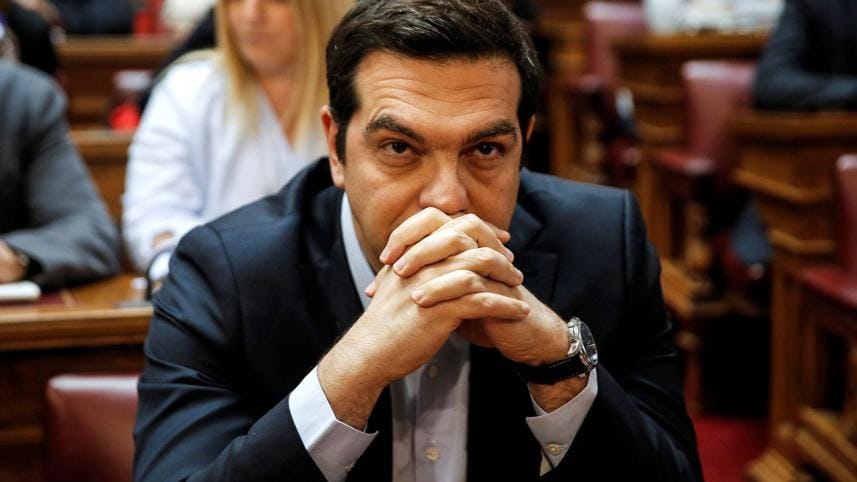Greek PM seeks debt relief, end to 'vicious cycle'

Greek Prime Minister Alexis Tsipras has said it is time to end the "vicious cycle" of cuts and to start talks with the eurozone on debt relief.
Controversial new pension and tax reforms were passed by Greece's parliament on Monday.
The measures are needed to unlock further international bailout money, to be discussed at a meeting of eurozone finance ministers on Monday.
But they are unpopular with Greek anti-austerity campaigners and unions.
"We have an important opportunity before us for the country to break this vicious cycle, and enter a virtuous cycle," Tsipras told MPs.
Monday, he said, "is a very important day. After six years, the Eurogroup will meet to discuss debt relief".
The meeting will talk about new debt relief measures with a view to avoiding the prospect of a default in July, when Greece is due make its next major repayment to the International Monetary Fund (IMF) and the European Central Bank.
Such progress on easing Greece's debts was possible only after "root and branch reform" of the pension system was agreed, Tsipras said.
The reforms agreed by parliament include:
--raising income tax for high earners;
--lowering tax-free thresholds;
--introducing a national monthly pension of €384 (£302; $437)
--phasing out a benefit for poor pensioners
Tsipras said the changes would not affect the majority of pensioners and moved towards a "sustainable" system.

Before the vote, protesters in Athens threw petrol bombs at police, who responded with tear gas.
Trade unions say the country cannot bear another round of austerity.
The debate in Greece's parliament on the reforms lasted for two days.
Thousands of people demonstrated, mostly peacefully, in Athens and in the country's second-largest city, Thessaloniki.
Three days of a general strike paralysed public transport, and slowed the public sector and the media.
Speaking before the vote, the leader of the Greek Communist Party, Dimitris Koutsoubas, said the Greek people would "not tolerate nor accept" the measures and would "show their true power" in the event of a Yes vote.
Fofi Gennimata, the leader of the centre-left Pasok party, said the bill represented the "total deconstruction of the pension system".
The leftist Syriza party secured just enough votes to pass the measures, thanks to the ruling coalition's tiny majority.
In a parliament of 300 seats, it has 153 lawmakers.
Tsipras was elected as prime minister on an anti-austerity ticket but later signed up to Greece's third international bailout since 2010.
Greece agreed to a third rescue package worth €86bn (£60bn) last year.
The IMF and other European partners are demanding that Greece implement further austerity measures to generate an extra €4bn (£3.1bn) in savings - contingency money in case Greece misses future budget targets.
Greece's Finance Minister Euclid Tsakolotos will be at Monday's meeting in the hope of securing a deal.
"We have done what we promised, and hence the IMF and Germany must provide a solution that is feasible," he said "a solution for the debt that will open a clear horizon for investors."
Last summer, Greece's debt crisis peaked when Athens defaulted on its debt payments and raised the spectre of a eurozone exit.
Greece is already looking to implement spending cuts that will amount to 3% of the country's gross domestic product or €5.4bn by 2018.
 For all latest news, follow The Daily Star's Google News channel.
For all latest news, follow The Daily Star's Google News channel.
Comments